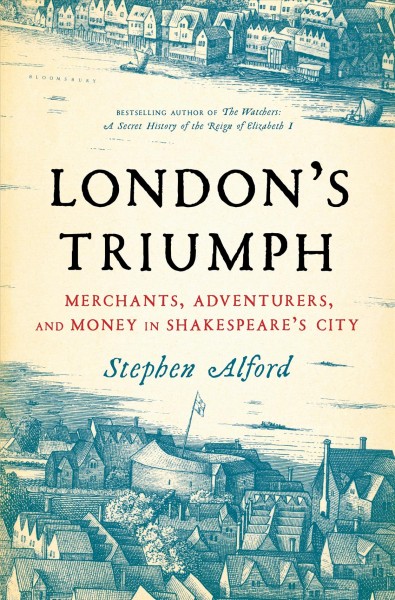 I’ve always been fascinated by how commerce worked in the Middle Ages and Renaissance. Like how do you move a hundred pounds of cloth from Yorkshire to Europe so you can sell it? How do you take out a loan when interest is considered a mortal sin? There is something simultaneously otherworldly and familiar about people working in long distance trade prior to the industrial revolution. This is why when I saw Stephen Alford’s new book, London’s Triumph: Merchants, Adventurers and Money in Shakespeare’s City, I snapped it up. Turns out Alford is the author of another book I enjoyed: The Watchers: A Secret History of the Reign of Elizabeth I.
I’ve always been fascinated by how commerce worked in the Middle Ages and Renaissance. Like how do you move a hundred pounds of cloth from Yorkshire to Europe so you can sell it? How do you take out a loan when interest is considered a mortal sin? There is something simultaneously otherworldly and familiar about people working in long distance trade prior to the industrial revolution. This is why when I saw Stephen Alford’s new book, London’s Triumph: Merchants, Adventurers and Money in Shakespeare’s City, I snapped it up. Turns out Alford is the author of another book I enjoyed: The Watchers: A Secret History of the Reign of Elizabeth I.
The essence of Alford’s book is how all the interlocking institutions in the lives of London’s merchants allowed them to take England from an economic backwater to one of the greatest empires in history. These are everything from the livery companies of London (essentially very powerful guilds overseeing various trades), the parishes that London was organized into, the stock exchanges first in Antwerp and then in London, and finally the joint stock companies set up spread the risk in high cost mercantile adventures.
One of the things that Alford stresses is that at the beginning of the Tudor period England was a cultural and economic backwater. When merchants in London wished to engage in foreign trade they had to go to Antwerp. Antwerp became one of the major goods emporiums of northern Europe, holding several fairs a year, where the English sold woolen cloth for exotic goods to be resold in England. Italian and German Banks in Antwerp also provided the English with access to various financial tools like loans and bills of exchange. What happened over the better part of 150 years is as England grew steadily stronger much of that business moved from Antwerp to England.
One of the things I found most interesting was the creation of joint stock companies for the purposes of exploiting trade with the far corners of the globe. Among these were the the Muskovy Company and the East India Company and the Virginia Company. I vaguely remembered that the Jamestown Colony was founded by the Virginia Company, but I had never read about the machinations back in London that had made it a reality. It’s also easy to forget here in the US that colonies like Jamestown, Plymouth and Massachusetts Bay were London business ventures.
This is a great book for people interested in late Renaissance history or Tudor history.


